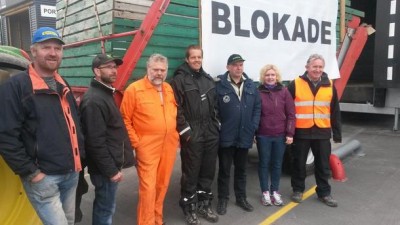Farmers who blocked egg packing and distribution factories across Norway from delivering their wares on Thursday announced on Friday morning they would end the blockade, several hours earlier than planned. The move was part of protest action by farmers following the breakdown of negotiations with the government on Tuesday, but political commentators argued the deal on the table is actually better than many recent offers.

Farmers’ organizations were satisfied they’d made their point that consumers shouldn’t take produce for granted, after widespread media coverage of the blockade. Nils T Bjørke from the farmer’s group Norges Bondelag told Norwegian Broadcasting (NRK) that he thought the demonstration had been well-received, unlike one poultry producer who noted that his hens hadn’t gone on strike.
The action was spurred after farmers’ organizations demanded an extra NOK 1.5 billion (USD 25.2 million) in state support on top of their current NOK 13 billion subsidy scheme, but the government would only offer NOK 150 million more. Bjørke said he was not concerned by a legal expert’s opinion that the blockade, and the sending of 60,000 text messages encouraging farmers to buy out stores’ egg supplies to create a shortage, was illegal.
“We have taken that with great calm,” said Bjørke. “This is a political stance, and the packing plants themselves have accepted that we have had these blockades.” Major egg processor Nortura told NRK it did not plan to seek compensation from farmers for delaying deliveries, or an injunction stopping the action.
Consumers didn’t sit on eggs
The farmers were confident they could create an egg shortage, depriving consumers of the eggs needed to create traditional 17th of May treats ahead of Constitution Day this weekend. “People know that we have an egg blockade, and I believe people will now choose to protect themselves before May 17,” first deputy Kristin Lanssen told news bureau NTB. “In any case, that’s what our members will do.”
Despite the union’s encouragement, customers didn’t rush to hoard eggs. Grocery chains reported selling more than normal, but no shortage was created. “Very many eggs were bought – significantly more than usual,” reported wholesaler NorgesGruppen. However, supermarket managers and warehouses reported having several cases still in cold storage.
While unions can disrupt distribution, they cannot halt production. Egg farmer Åge Flemming Larsen confirmed to NTB that there would be no ongoing shortage. “My hens aren’t on strike, so here it is full speed ahead,” he said.
State offer better than previous years
Despite farmers’ anger over what they’re calling a “historically low” offer, newspaper Aftenposten reported the deal is actually better than the farmers’ contend, and better than the deals they secured under the Bondevik-led government in 2003 and 2004, and under the Stoltenberg-led government in 2000. The farmers were also dissatisfied just two years ago, when their own Center Party held government power and ran the agriculture ministry.
The government decided to cut state support by NOK 250 million, far less than the NOK 5 billion the Progress Party proposed cutting in its alternative budget, and the NOK 1.5 billion the Conservatives wanted to remove. The government still offered a net support increase of NOK 150 million on top of the NOK 13 billion it already provides, despite the fact farmers’ income growth between 2005 and 2013 has been considerably higher than for other salary groups. At the same time costs are lower than usual, largely because of lower interest rates.
Aftenposten reported that instead of losing money, all of the economic factors meant the settlement proposed by the government would be neutral. It would return to the original level for the majority of agricultural settlements before 2005, meaning farmers’ salaries would grow about the same percentage amount each year as in other industries.
Neither is the distance between what farmers are asking for and what Agriculture Minister Sylvi Listhaug offered “historically high” as claimed, according to figures from the Norwegian Agricultural Economics Research Institute (Norsk institutt for landbruksøkonomisk forskning). The gap was larger in five settlements since 2000, most recently in 2011. This year’s distance is close to the average for the period between 1990 and 2013.
While small farmers are angry the government wants to favour large-scale producers, Aftenposten concluded that the economic outlook is not too bad for the majority of farmers.
newsinenglish.no/Emily Woodgate

